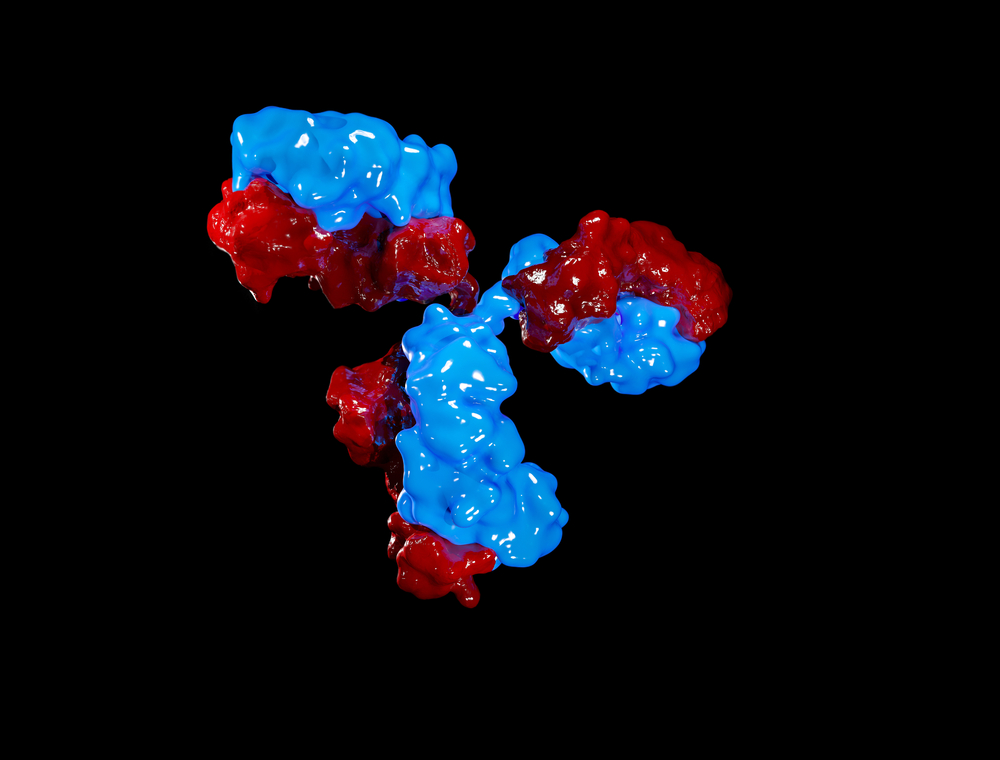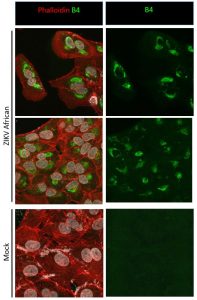
Image by Virology Research Services Ltd
Immunofluorescence: Vero cells were seeded on coverslips infected with ZIKV (African or Asian strains) for 30h at MOI 0.5. Control coverslips consisted of uninfected Vero cells. After fixation with 4% PFA, samples were stained with Mouse anti-Zika virus NS1 (B4). Antibody was diluted 1:500 and Triton X-100 was used as detergent. Imaging was performed using a Leica SP5 confocal microscope. Immunofluorescence for both African and Asian strains was observed. African strain is illustrated above (Virology Research Services Ltd).
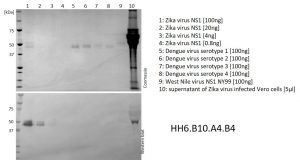
Western blot: Variable amounts of antigen were loaded onto a NuPAGE 4-12% Bis-Tris gel (Life Technologies) and separated at 200V for 55 minutes. Western blot was performed using a Transblot Turbo system (Biorad) with pre-packed nitrocellulose membrane (Biorad). As blocking agent 5% non-fat milk powder in PBS-T was used. Antibodies were used at concentrations of 1ug/ml. Secondary antibody used was goat-anti-mouse-IgG-HRP (Bio-Rad). Western blots were developed using TMB Membrane (KPL).
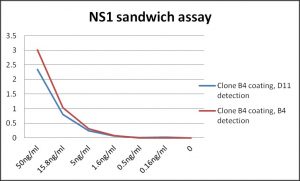
An ELISA plate was coated with 500ng of coating antibody, then blocked with Casein, and samples were added at a range of concentrations. Detection antibody was biotinylated, and used at a concentration of 0.25ug/ml. Visualisation was with Streptavidin:HRP and the substrate used was TMB (KPL).
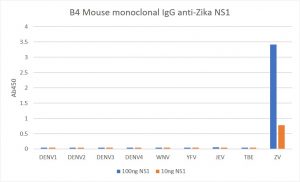
ELISA assay: An ELISA plate was coated with 10ng and 100ng of NS1 antigen per well, then blocked with 1% BSA. Primary antibody was used at a concentration of 1ug/ml, and the detection antibody used was Goat anti-mouse IgG:HRP (Bio-Rad, 1:2000). The substrate used was TMB (KPL).
MOUSE ANTI-ZIKA VIRUS NS1 ANTIBODY (B4)
Mouse anti Zika virus NS1 antibody is specific for the NS1 protein of Zika virus, detecting NS1 from both the Uganda and Suriname strains. It demonstrates negligible cross-reactivity with NS1 proteins from Dengue virus (all serotypes), Japanese Encephalitis Virus and Yellow Fever Virus. This mouse anti Zika virus NS1 antibody is suitable for use in direct ELISA, sandwich ELISA, Western blot and immunofluorescence.
PRODUCT DETAILS – MOUSE ANTI-ZIKA VIRUS NS1 ANTIBODY (B4)
- Mouse anti-Zika virus NS1 protein monoclonal IgG1 antibody (clone B4).
- Greater than 95% purity by SDS-PAGE and buffered in PBS, pH7.4.
BACKGROUND
The NS1 protein is a major non-strucutural protein expressed by the Zika Virus. The NS1 monomer is a glycosylated protein of approximately 45kD, which associates with lipids and forms a homodimer inside infected cells. It is necessary for viral replication, and is also secreted into the extracellular space as a hexameric lipoprotein particle, which is involved in immune evasion and pathogenesis by interacting with components from both the innate and adaptive immune systems, as well as other host factors. NS1 is one of the major antigenic markers for viral infection with Zika.
Zika virus is an emerging disease that is spread by Aedes mosquitoes. The virus was first isolated in Central Africa, and has since spread to South Asia and more recently to South America. It is a member of the flavivirus family, and is structurally closely related to viruses such as Dengue Fever Virus. Outbreaks were reported in Micronesia in 2007 and in Brazil in 2015, confirming at least 13 autochthonous infections. The Zika virus outbreak in Brazil in 2016 has gained world-wide attention, and has been linked to an increasing number of microcephaly cases. In April 2016 the Centers for Disease Control, in the USA, confirmed the link between Zika virus infection of the fetus with microcephaly.
Clinically Zika virus can cause mild fever, rash, myalgia, arthralgia and headaches, with one in four infected individuals being asymptomatic. Due to similar symptoms Zika virus infected individuals can easily be mis-diagnosed as a dengue infection and vice-versa. In addition, Zika virus has been implicated in causing microcephaly through transmission in utero. There is no vaccine or specific treatment available for Zika virus.


